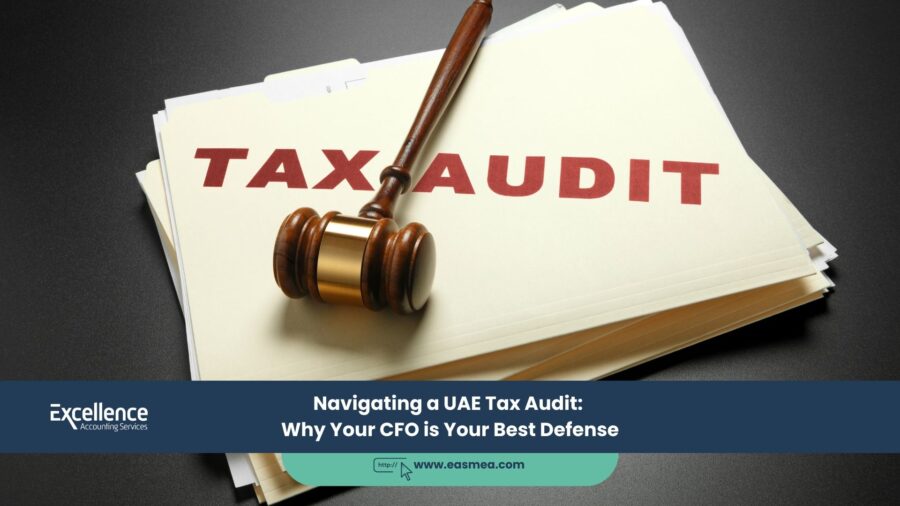Navigating a UAE Tax Audit: Why Your CFO is Your Best Defense
With the establishment of VAT and the recent introduction of Corporate Tax, the UAE’s business landscape has entered a new era of compliance. For the Federal Tax Authority (FTA), tax audits are the primary tool for ensuring this compliance. An audit notification is no longer a remote possibility; it is a standard and expected part of the business lifecycle. For any company, receiving that notification can be a source of significant stress and disruption. However, for a well-prepared organization, it is a manageable process. The key to this preparation and management is the strategic leadership of a Chief Financial Officer (CFO).
- Navigating a UAE Tax Audit: Why Your CFO is Your Best Defense
- The CFO's Role Before the Audit: Building the Fortress
- The CFO's Role During the Audit: The Commander on the Field
- The CFO's Role After the Audit: Learning and Improving
- Your Best Defense: Expert CFO and Tax Services from EAS
- Frequently Asked Questions (FAQs)
- Are You Prepared for an FTA Tax Audit?
A CFO’s role in a tax audit goes far beyond simply providing records to an inspector. A strategic CFO is the company’s chief defender. Their work begins years before an audit is ever announced, by building a fortress of robust internal controls and meticulous records. During the audit, they act as the central commander, managing the flow of information and articulating the company’s tax positions. After the audit, they are the architect of any necessary improvements.
This guide explains the pivotal role of a CFO throughout the entire tax audit process in the UAE. We will explore how their proactive preparation, strategic management during the audit, and diligent follow-up can transform a potentially damaging event into a validation of the company’s financial integrity.
Key Takeaways
- Preparation is Everything: A CFO’s most important work happens *before* the audit notice arrives, by establishing strong internal controls and ensuring accurate, well-documented financial records.
- The CFO is the Single Point of Contact: During an audit, the CFO should be the primary liaison with the FTA. This ensures consistent, controlled, and accurate communication, preventing misinterpretations.
- Defense is in the Documentation: A successful audit defense relies on the ability to provide clear, contemporaneous documentation that supports every tax position taken on the returns.
- It’s a Test of Your Systems: A tax audit is not just an audit of your numbers; it’s an audit of your entire financial system, from your accounting software to your internal approval processes.
- Expertise is Non-Negotiable: Navigating the complexities of a tax audit requires deep technical knowledge. An experienced CFO, often provided through outsourced CFO services, is a company’s most valuable asset in this process.
The CFO’s Role Before the Audit: Building the Fortress
The outcome of a tax audit is largely determined by the work done in the years leading up to it. A strategic CFO focuses on creating an “audit-ready” organization at all times.
- Implementing Robust Internal Controls: This involves creating clear, documented policies and procedures for all financial transactions. This ensures that the data recorded is accurate and that there is a clear audit trail for every number on the tax return.
- Ensuring Meticulous Accounting and Bookkeeping: The CFO oversees the finance team to ensure that all transactions are correctly classified and supported by proper documentation (invoices, contracts, receipts).
- Conducting Internal Reviews: Proactively conducting periodic internal reviews or mock audits to identify and correct potential weaknesses before the FTA does. This is a key function of an internal audit.
- Making Defensible Tax Positions: For complex areas of tax law (like transfer pricing or interest deductibility), the CFO ensures that the company’s position is not only compliant but also well-documented with supporting analysis.
A tax audit is like an open-book exam. A good CFO ensures the book is well-written, accurate, and has a comprehensive index before the exam even starts.
The CFO’s Role During the Audit: The Commander on the Field
Once the audit notification arrives, the CFO takes charge of the process, acting as the strategic commander to ensure a smooth and efficient engagement.
| Responsibility | Why it’s Critical |
|---|---|
| Act as the Single Point of Contact | This prevents confusion and ensures that all communication with the FTA is controlled, consistent, and accurate. It stops junior staff from providing incomplete or speculative answers. |
| Manage Information Requests | The CFO reviews every request from the FTA to understand its scope and ensures that only the specific information requested is provided. This prevents “scope creep” and unnecessary disclosure. |
| Articulate and Defend Tax Positions | When the auditor questions a specific transaction or tax treatment, the CFO is the one who can explain the commercial rationale and legal basis for the position, supported by the prepared documentation. |
| Manage the Team and Timeline | The CFO coordinates the internal team to gather the required documents promptly and manages the overall timeline of the audit to bring it to a conclusion as efficiently as possible. |
The CFO’s Role After the Audit: Learning and Improving
The CFO’s job doesn’t end when the auditor leaves. The post-audit phase is crucial for long-term compliance.
- Reviewing the Audit Findings: The CFO carefully reviews the FTA’s final report. If there are disagreements, they will lead the process of filing a reconsideration or appeal.
- Implementing Remedial Actions: If the audit identifies weaknesses in processes or controls, the CFO is responsible for designing and implementing the necessary changes to prevent the same issues from recurring.
- Future-Proofing the Business: The lessons learned from an audit are invaluable. The CFO uses these insights to strengthen the company’s overall financial governance and prepare it for future growth and scrutiny.
Your Best Defense: Expert CFO and Tax Services from EAS
For many businesses, having a full-time CFO with deep tax audit experience is not practical. Excellence Accounting Services (EAS) provides the expert, on-demand support you need to face a tax audit with confidence.
- Outsourced CFO Services: Our experienced CFOs can act as your strategic leader throughout the audit process, from initial preparation to final resolution.
- Tax Audit Assistance: We provide hands-on support during an FTA audit, helping you prepare documentation, respond to queries, and defend your tax positions.
- Expert Corporate Tax and VAT Consultancy: Our tax specialists provide the deep technical knowledge needed to interpret complex tax laws and ensure your business is fully compliant.
- Internal Control and Process Improvement: We can review your existing financial processes and help you build the robust internal control framework needed to be “audit-ready” at all times.
Frequently Asked Questions (FAQs)
An audit can be triggered for many reasons, including random selection, inconsistencies in your tax returns, filing for a large VAT refund, whistle-blower tips, or being in a high-risk industry sector. The best approach is to assume you will be audited at some point.
The FTA is required to provide at least five business days’ notice before conducting a tax audit, unless they suspect tax evasion.
Common focus areas include the correct application of zero-rated VAT on exports (supported by documentation), the recovery of input tax (especially on blocked items like entertainment), and the correct treatment of complex supplies.
Under the UAE Tax Procedures Law, you must keep all required records for at least five years after the end of the relevant tax period.
Penalties can be severe, including fixed penalties for procedural errors (like late filing) and tax-geared penalties for incorrect returns, which can be a percentage of the unpaid tax.
For a complex or unusual transaction, a CFO may proactively prepare a “tax position paper.” This is a document that outlines the facts of the transaction, the relevant tax law, and the company’s reasoning for treating it in a particular way. This can be a powerful piece of evidence during an audit.
Yes. The FTA has the right to interview any relevant person during an audit. This is why it’s crucial for the CFO to manage the process and prepare any staff who may be interviewed, ensuring they understand the importance of providing accurate and factual information.
You have the right to appeal. The first step is to submit a “Reconsideration Request” to the FTA. If that is unsuccessful, you can then appeal to the Tax Disputes Resolution Committee (TDRC) and subsequently the courts.
A desk audit is conducted remotely from the FTA’s offices, where they will request you to submit documents electronically. A field audit involves the tax auditors visiting your business premises to review records and systems on-site.
An effective outsourced CFO is deeply integrated into your financial processes, even if they are not physically present every day. They will have full access to your accounting systems, be in regular communication with your team, and will have been instrumental in designing the very controls and processes that the audit will test. They are perfectly positioned to lead the defense.
Conclusion: Turning a Challenge into an Opportunity
A tax audit should not be viewed as a crisis, but as a rigorous test of a company’s financial health and discipline. With a strategic CFO at the helm, a business can face this test not with fear, but with confidence. By building a strong foundation of controls and records, managing the process with professionalism, and learning from the outcomes, a CFO can turn the challenge of a tax audit into an opportunity to validate and strengthen the business for the future.
Are You Prepared for an FTA Tax Audit?
Contact Excellence Accounting Services to ensure your business is audit-ready with our expert CFO and tax advisory services.




